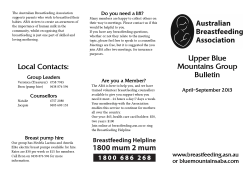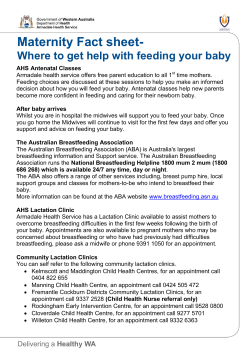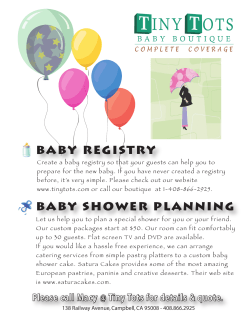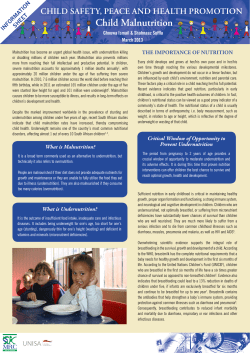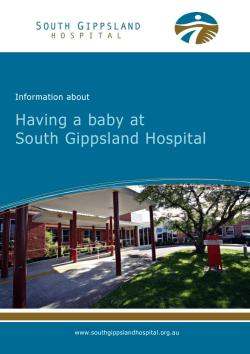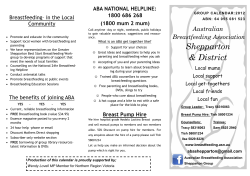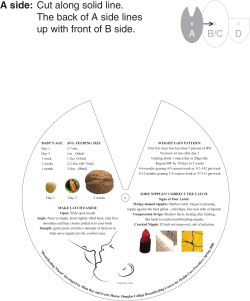
Sheet Fact 15 Postnatal DePression anD BreastfeeDing
Fact Sheet 15 Postnatal Depression and Breastfeeding (Adapted from Postnatal Depression and Breastfeeding Booklet, jointly produced by PANDA and Australian Breastfeeding Association) Most pregnant women plan to breastfeed because they see it as the best thing for their baby. But even with access to good information and attending preparation classes it is difficult to anticipate what lies ahead. The relationship between postnatal depression and breastfeeding is complex and different for each woman, it can be positive or negative. For some women breastfeeding can help reduce the likelihood of postnatal depression developing or the duration of the depression. For others it may be the greatest source of stress and anxiety, and it is more beneficial for the mother to stop breastfeeding. BREASTFEEDING Breastfeeding is important for both mother and baby. Given the right support, accurate information and management, it should be possible for nearly all mothers to breastfeed. Breastfeeding has many physical and health benefits for the mother and baby. The feeding relationship is a crucial component of the early bonding between mother and infant. More information about breastfeeding can be found in the Australian Breastfeeding Association booklet An Introduction to Breastfeeding. Beyond the physical mechanics of breastfeeding, a number of emotional and social factors impact the capacity of a mother to breastfeed, these are listed below. These factors are often restricted by the presence of postnatal depression. • C onfidence in the ability of your body to breastfeed. The belief that you will be able to produce enough breastmilk to fully nourish your baby and that your body’s efforts are good for your baby. • C onfidence that your desires and needs are important, and that the decisions you make about feeding your baby are best for you and your baby. • A bility to advocate for yourself and your baby by asserting your needs and making sure that you are heard and responded to. • C onfidence in your ability to take control of your situation, and to seek help when needed from your partner, family and support services. • H aving the emotional and physical energy to persevere through the early phases of establishing breastfeeding and the challenging periods of breastfeeding. • H aving the ability to read your baby’s subtle communications about what s/he needs. Baby’s crying is cry is not always about being hungry. • Being emotionally and physically available to your baby and attuned to his/her needs, rather than being preoccupied by your own emotions and needs. • H aving the ability to cope with the unknown and the unpredictable. Often breastfeeding mothers don’t know exactly what the baby wants and feel uncertain about producing enough milk. It is important to rely on the signs that you know in order to reassure yourself that the baby is getting enough milk. • Confidence in your ability to think clearly, and solve any problem that might arise. “Breastfeeding was pretty well established by the time I left hospital; however I think I never truly felt comfortable with my breastfeeding ability, despite having a contented baby with all the correct “healthy” signs (weight gains, wet nappies etc.). I do not think I was ever really confident that she was doing well on my breastmilk, as I could not show how much she had taken each feed and was not able just to trust my own instincts. I think I knew about counting the number of wet nappies in 24 hours, but I wish someone had really stressed that point to me…The lack of confidence in my breastfeeding was mirrored in a general lack of confidence in my role as a mother”. (Shona) The relationship between postnatal depression and breastfeeding: The relationship between postnatal depression and breastfeeding is yet to be fully investigated (Coombes, 1996). For women with postnatal depression, the experience of breastfeeding can be both positive or negative. Positive aspects of breastfeeding during postnatal depression: • B reastfeeding your baby can help make you to feel capable and a success at something, when your depression makes you feel incapable, disempowered and hopeless. It can help build your confidence as a mother. • W hen you are feeling stressed, anxious and uptight, to sit and feed your baby can be soothing, relaxing and calming. • T he physical and emotional closeness provided by breastfeeding can strengthen the intimacy between you and your baby. Particularly if your depression is making you are feeling distant from your baby and unsure how to relate to him/her. • W hen you are feeling like the baby likes everyone else but you, that s/he doesn’t need you and would be better off without you, breastfeeding provides an example of how important you are to your baby. Only you can make him feel ‘drunk’, floppy, full and growing. These experiences are examples of when breastfeeding is a positive experience during postnatal depression. If you feel positive about breast feeding, it is vital that you do not give up breastfeeding because you have postnatal depression. Negative aspects of breastfeeding during postnatal depression: • W hen you are experiencing problems with how you feel and coping with the baby, you may perceive breastfeeding to be a cause of these problems. • W hen you are having difficulty reading your baby’s cues, you may produce a more negative interpretation of your baby’s behaviour whilst feeding at the breast. (Dunnewold et al, 1996). • W hen you have had a traumatic breastfeeding experience such as cracked nipples, a negative experience in hospital, mastitis or an unexpected hospitalisation, you may feel that breastfeeding requires more tolerance of pain and discomfort than you feel capable of. • W hen you feel your baby doesn’t like breastfeeding or you, you may feel that you cannot provide enough for your baby. hen your baby settles on the bottle, you may feel that there is no point to persisting with • W breastfeeding. • Y ou may see your baby’s dependence on your body and mind as too invasive and overwhelming, especially if it is linked to past sexual abuse. You may not be able to describe your reasons for not wanting to breastfeed or to persevere further if this is the case. BREASTFEEDING AND MEDICATION Many mothers with postnatal depression have faced the prospect of needing to commence antidepressant medication whilst breastfeeding. Let your medical adviser know continuing breastfeeding is important to you. The decision should be made by you with your partner and medical advisers, exploring at the risks versus the benefits. The risks to you and your baby of ongoing, untreated depression and anxiety must be considered when weighing up the pro’s and con’s. The physical and psychological importance of breastfeeding for both you and your baby is likely to outweigh any potential negative effects of antidepressant medication on your baby via the breastmilk. The lack of clear knowledge about the transfer of antidepressants into breastmilk and their effect on the baby may mean that you become confused by the advice you receive. Ask your doctor for more information about the medication s/he is recommending and its potential side effects. You can also make contact with a reputable independent medication information service run by pharmacy departments at some major hospitals. They will be able to provide you with accurate and up-to-date information about the compatibility of the medication with breastfeeding. Antidepressant medication passes into breastmilk in very small amounts. Studies of several types of antidepressants have not shown them to cause any significant problems for the baby at the time they are taken. Some antidepressants have been used widely with breastfeeding mothers with no negative effects being identified on the baby’s behaviour, growth or development when the baby is followed up some years later. Most women are able to find an antidepressant which is compatible with breastfeeding. Do I need to wean my baby? Breastfeeding is important, and weaning should not be routinely recommended unless there is substantial evidence that the drug prescribed for the mother will be harmful to the infant, that breastfeeding is a significant source of stress for the mother, or there are concerns about the well being of the baby. The decision to wean is made in consultation with your medical advisers and partner. For some mothers the decision to wean is a relief. Either way, if breastfeeding was part of your plan regarding how you would like to feed your baby, it is only to be expected that you will grieve the loss of the breastfeeding relationship. Acknowledge the loss. You may regret things turned out the way they did, but there is no need to feel guilty about the decisions you made. Remember that breastfeeding is only one aspect of raising a child. Many women report they felt guilty, or felt a failure, because they weaned their baby, even if their decision was based on medical or health reasons. It can be important to get support to deal with these feelings, to avoid them adding to the emotional burden of postnatal depression. Abrupt weaning should be avoided if possible as it produces physical and hormonal changes that may complicate the treatment of a woman with postnatal depression. The breastmilk supply must be reduced gradually, managed as an important part of the woman’s treatment for depression. For some mothers, partial breastfeeding may be an alternative, rather than total weaning. The knowledge that they are not totally responsible for their baby’s nutrition can reduce the pressure they feel. Partial breastfeeding, even as little as one breastfeed each day continues the positive aspects of breastfeeding for mother and baby and reduces concern about the impact of medication on the baby. Coping with postnatal depression while breastfeeding Coping with a new baby and breastfeeding can be hard work for any mother. For a mother with postnatal depression it can seem extremely overwhelming. It is OK to take some short cuts to help you get through the day. You may feel you are expected to become a ‘supermum’; look after your baby, run a perfect household etc, but it is more important that you take the time to recover. Australian Breastfeeding Association booklet Looking After Yourself has further detail about taking care of yourself, nutrition and exercise for mothers. Here are a few strategies recommended for looking after yourself. • T ry to be clear about how you feel about breastfeeding. If you can, it is important to continue to breastfeed while being treated for postnatal depression. If you decide to stop breastfeeding make sure that you get support to wean and avoid abrupt weaning. It is your decision and a personal one that needs to be supported. The Australian Breastfeeding Association booklet Weaning can provide more information about how to go about doing this. • A s you begin to breastfeed consciously slow your thinking and focus on how you are feeling and what you are about to do. Arrange what you need before you sit down to feed, e.g. drink, pillows etc. As you feel more confident with breastfeeding your baby, you may like to try to feed lying down on your bed so you can relax and rest. If you feel very tired or fatigued then breastfeeding in the side lying position has been shown to reduce fatigue. • M ost mothers sleep with their baby sometimes as it can help them get more sleep. Other mothers find it too overwhelming and prefer their baby to be in the next room. Sleep routines are good for some babies whereas others are less predictable. The rule of thumb is to find what works for you and your baby so you can get as much sleep as possible. Try to rest when your baby does to catch up on sleep. Don’t worry if the housework is not done, this won’t last forever. The Australian Breastfeeding Association booklet Understanding Wakeful Babies has more useful information about babies and sleep. • A ttend your Australian Breastfeeding Association local group, a PND support group or playgroup, or ask your child health nurse to put you in touch with other mothers in your area. Although being with other people may be the last thing you feel like doing and it may seem daunting at first, the long-term benefits may be very rewarding for you and your baby, and you may make some good friends. You may find yourself looking forward to meeting each week. • S etting aside some time to play with your baby. Sometimes this can be difficult with the demands on you and with how you feel. Sometimes the mother-baby bonding process can take time, and having free play with your baby will help with that, even if you can only make eye contact and smile at him. Baby massage and skin-to-skin contact can help make you feel more comfortable with you baby. Please contact PANDA for references in this fact sheet. Australian Breastfeeding Association www.breastfeeding.asn.au PANDA Contact Us: 810 Nicholson St, North Fitzroy, VIC, 3068 Support: 1300 726 306, Admin: 03 9481 3377, Fax: 03 9482 6210 Email: info@panda.org.au Post and Antenatal Depression Association Inc. www.panda.org.au
© Copyright 2025

